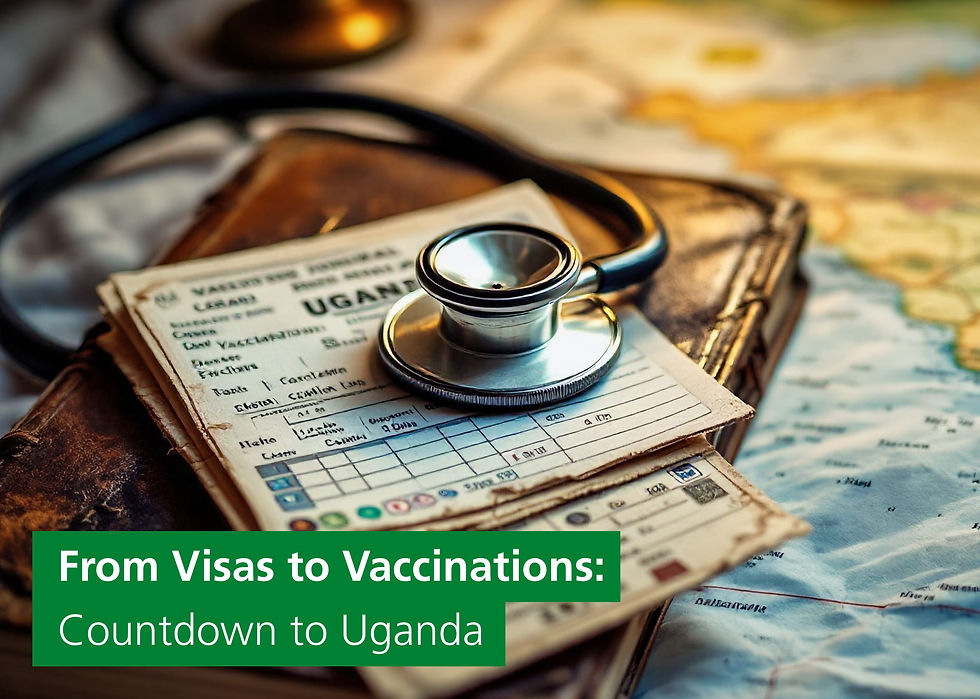
Having done a number of blogs following my visits to various African countries - in particular, Kenya and Uganda, I thought that I would start this one a month before, just to show you how much preparation is involved in one of these trips.
In January 2025 I will be travelling back to Uganda to visit Dr Jan White in Mbale to discuss a potential project to build a new Health Centre and Hospice. I will also be dropping in on our sister organisation Mildmay Uganda to discuss a potential Memorandum of Understanding and possible future joint projects.
Before any visit can take place there are a number of things that have to happen. The first is that once the dates have been agreed a letter of invitation has to be received from one of the local organisations hosting the visit. Without this, unless you are a tourist visitor, a visa will not be issued by the country concerned. It is always a good idea to give yourself at least a month to apply for the electronic visa online although I have had them approved in just two days. The process should be quite simple but because the scanned images of your passport and vaccination paperwork must be less than 280 Kb, which is an insanely low resolution, this always takes longer than expected.
Once a visa has been obtained you can then begin the process of booking flights and hotels. Whilst flights are relatively quick and simple to book, hotels can be problematic. On more than one occasion I have turned up at the hotel with my booking confirmation to be told that I don’t have a reservation and on one occasion there were no other rooms available. Not what you want to hear when you have just travelled many hours. On that particular occasion once I produced the booking confirmation the management team went into something of a tail-spin as they tried to sort something out for me. They did manage, although the stand-by hotel was not particularly pleasant even if it was only for one night. So the first rule of international travel is to always have a paper copy of your booking confirmation on you and readily available.
It is always a good idea to check that you have at least six months left on your passport on the date that you travel because some airlines will not let you board without. This is something that I find truly amazing and fortunately has never happened to me. Certain airlines will happily take your booking and passport details, at the point of booking, and still turn you away at the gate.
Travel Insurance is essential. Whilst you may not be taking part in anything particularly adventurous there is always the chance of falling ill or being bitten by something that wants to make a meal of you. So on the off-chance that you will need to take advantage of a medivac home, it is worth having.
Make sure that you have all of the required medication in advance. So if you are having to take anti-malaria tablets, before, during and after your visit, don’t find out that you have run out the week before you travel.
One of the last things I like to have sorted out before I travel are my airport trips. As much as possible I like to take public transport. There are some occasions when this is just not possible, such as travelling on a Sunday when there simply aren’t enough buses to get you where you want to go. Fortunately in the UK we are fairly well served and so this has, thus far, never been a problem.
Sorting out currency before you travel has become a lot easier now that most of the world, including rural parts of Africa, have gone digital. I now try to travel with the minimum actual currency and tend to take US Dollars as opposed to anything else. Occasionally I might use Kenyan or Ugandan Shillings, but rarely.
And that is it. All of the preparations done and we are ready for our trip.
Geoff Coleman
Chief Executive
Mildmay Hospital
See Geoff's previous Muzungu blog posts here:
Please support our WInter 2024 Fundraising Appeal:
Mzungu, also known as muzungu, mlungu, musungu or musongo, is a Bantu word that means "wanderer" originally pertaining to spirits. The term is currently used in predominantly Swahili speaking nations to refer to foreign people dating back to 18th century. The noun Mzungu or its variants are used in Kenya, Tanzania, Uganda, Malawi, Rwanda, Burundi, Democratic Republic of the Congo, Comoros, South Africa, Zimbabwe, Mayotte, Zambia and in Northern Madagascar (the word changed to "vozongo" in Malagasy, but locals will still understand the word mzungu) dating back to the 18th century.


Comments